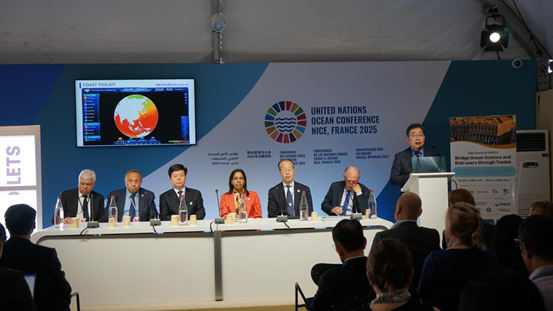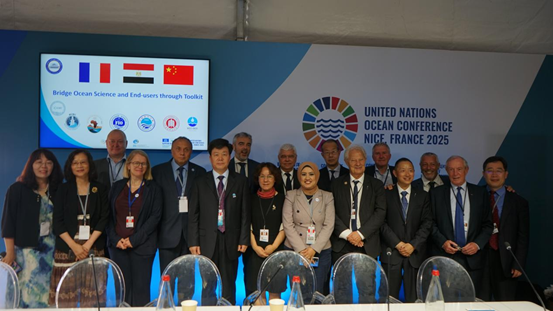Special Side Event at the 3rd UN Ocean Conference Showcases COAST Led by Chinese Research Team
At the 3rd United Nations Ocean Conference, China unveiled its Coastal city Ocean bAsed Solution Toolkit for sustainable development (COAST), a groundbreaking marine governance solution developed by the First Institute of Oceanography (FIO), Ministry of Natural Resources of China. The toolkit was spotlighted during the side event "Bridge Ocean Science and End-users through Toolkit," where experts engaged in in-depth discussions on its applications.
Why was the COAST developed?
The ocean is vital to human survival and development, yet its sustainability faces unprecedented challenges. For millennia, coastal cities have thrived on marine resources, but today, over 90% of excess heat from global warming is absorbed by the oceans, compounded by overexploitation, ecological degradation, and intensifying marine disasters. These have brought great impact on sustainable development of humanity.
Addressing these challenges requires global collaboration and science-based solutions. However, the complexity of marine science often hinders public engagement. While awareness has grown, translating knowledge into action remains difficult—akin to needing a user-friendly "camera" rather than abstract optical theories. The COAST serves as this "camera," transforming cutting-edge research into actionable tools for policymakers and communities.
Why can Chinese research teams lead the development of the COAST?
In 2015, the United Nations proposed the Sustainable Development Goals (SDGs) among which the SDG14 focuses on the oceans. Later in 2017, "Decade of Ocean Science for Sustainable Development (2021-2030) (the Ocean Decade)" was approved by the UN General Assembly, transferring ocean science from research to science-based solutions to ocean governance.
The COAST developed by Chinese teams features three core advantages:
First, deep engagement in the top-level design and a international platform. China has been deeply involved in the Ocean Decade initiative since its planning phase. In 2018, 19 leading scholars and managers were selected globally to form the "Ocean Decade" Executive Planning Group (EPG) including Prof. QIAO Fangli of FIO who participated in the design of the roadmap and the implementation plan of the Ocean Decade initiative. On this basis, China successfully established the UN Ocean Decade Collaborative Center on Ocean-Climate Nexus and Coordination amongst Decade Implementing Partners in P.R. China (DCC-OCC), leading seven international programs like Ocean to climate Seamless Forecasting (OSF) system programme, setting a solid international platform for the development of the COAST.
Second, originally developed forecasting theory and innovative ocean observing technologies. Chinese experts originally proposed the "wave-turbulence interaction" theory and improved the forecasting accuracy of upper sea by 80%, significantly enhancing the prediction capacity of typhoons and climate. In addition, making innovative use of the GNSS, Chinese experts have developed cost-effective intelligent buoys, overcoming cost barriers in ocean observation.
Third, successful application experience and high-quality research teams. FIO's team has played vital roles in tackling crises like the Bohai oil spill in 2006, Fukushima nuclear leak in 2011, Sanchi tanker disaster in 2018 and search and rescue operations for sunken ships in Thailand and Cambodia in 2018 and 2022, thereby acquiring rich experience and building itself a high-quality research team.
Who do the COAST serve?
The COAST provides systematic solutions for the sustainable development of global coastal cities. It aims to help authorities and the public in crisis assessment and planning and decision optimization, thus improving the sustainable development ability and coastal resilience.
Currently, the COAST features six core modules (ocean and climate early warning, maritime safety, offshore ecological health, coastal integrated management, blue economy support and ocean literacy improvement) and 24 sub-modules, covering key areas of sustainable development of coastal cities. By integrating marine big data, advanced numerical models, AI technologies and capacity building, the COAST serves as visualized, cost-effective decision-support tools for end-users and decision-makers, freely accessible worldwide under the Ocean Decade's co-design, co-delivery, and co-benefit framework.
Global Recognition at the UN Ocean Conference
The 3rd UN Ocean Conference gathered 15,000 representatives from about 120 countries worldwide to discuss global ocean governance. The COAST developed by Chinese research teams, was highlighted as a key achievement of the UN Ocean Decade and an innovative solution for global ocean governance, garnering significant attention during the conference.
On June 7, one of the three special events titled "Ocean Rise and Coastal Resilience Summit" was convened, gathering mayors of coastal cities and policy makers. The COAST was introduced as one key achievement with Prof. QIAO Fangli, its lead designer, invited to deliver a keynote presentation.
On June 10, a side event titled "Bridge Ocean Science and End-users through Toolkit" took place. Speakers included SUN Shuxian, Vice Minister of China's Ministry of Natural Resources, Amr Hamouda, former President of the National Institute of Oceanography and Fisheries of Egypt, and Vice Chair of IOC/UNESCO, Francis Vallat, Founding President of the French Maritime Cluster and the European Network of Maritime Clusters, Yutaka Michda, Chair of the IOC, and Leticia Carvalho, Secretary-General of the International Seabed Authority. The session was chaired by Vladimir Ryabinin, former Executive Secretary of the IOC/UNESCO, and Suzan M. El-Gharabawy, Vice President of the National Institute of Oceanography and Fisheries of Egypt.
In his address, Vice Minister Sun Shuxian emphasized, "Scientific and technological innovation is the 'golden key' to solving ocean governance challenges. The COAST establishes a platform for dialogue and cooperation, sharing technology and services to enhance the integrated ocean management capabilities of developing countries and strengthen the resilience of coastal cities, thereby better protecting and sustainably utilizing the ocean." Participants highly praised the scientific value and application prospects of the COAST, recognizing its practicality, openness, and adaptability as key technical support for global coastal cities, particularly in developing nations, and as a driving force for achieving the UN's SDG14 goals. Representatives from governments, international organizations, and NGOs engaged in in-depth discussions on its applications, unanimously affirming it as a significant milestone in translating ocean science into governance practice. Developing country representatives expressed particular interest in its localized application, hoping for further functional optimization through international collaboration to better serve the sustainable development needs of vulnerable coastal regions.
The COAST is a testament to the Chinese research team's deep involvement in the UN Ocean Decade, distinguished by its comprehensiveness and precision in contributing to the international community. Its release demonstrates Chinese researchers' commitment to global ocean governance and advancing a maritime community with a shared future. Moving forward, the research team will continue to drive scientific and technological innovation, foster international cooperation, refine the COAST, and expand its global application, contributing wisdom and solutions to safeguard our shared blue planet and achieve sustainable ocean development worldwide.

Deputy Director General QIAO Fangli introduces the COAST

Group photo


